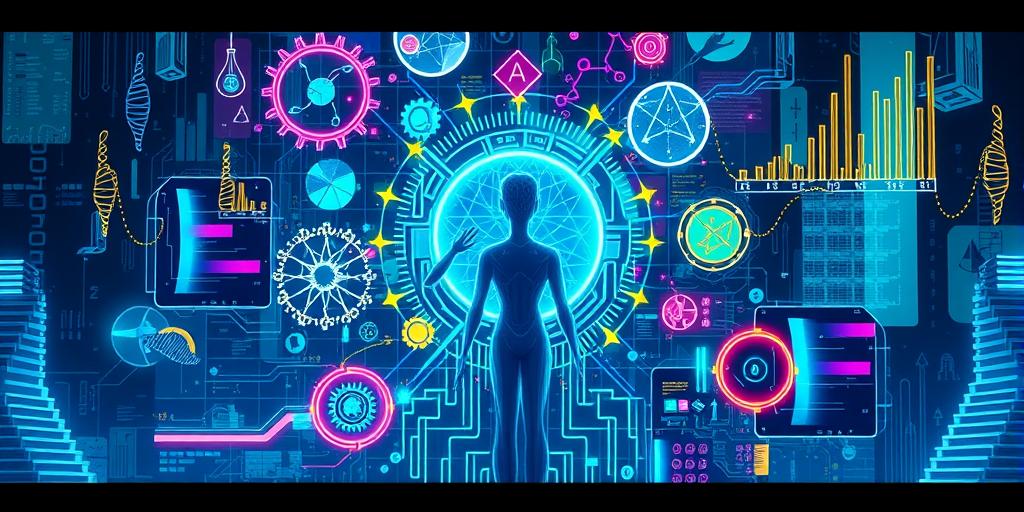Have you heard the buzz? Artificial intelligence is no longer a futuristic fantasy; it's revolutionizing American science right now! From groundbreaking discoveries to streamlining research processes, AI's impact is undeniable. Prepare to be amazed as we explore seven incredible ways AI is transforming the scientific landscape in the United States. Get ready to witness the future of research, unfolding before your eyes!
1. AI-Powered Drug Discovery: A Revolution in Healthcare
The pharmaceutical industry is undergoing a seismic shift, and AI is at the heart of it. Imagine a world where developing new drugs is faster, cheaper, and more efficient. That world is rapidly becoming a reality thanks to AI's ability to analyze massive datasets, identify potential drug candidates, and predict their efficacy and safety. This process significantly reduces the time and cost associated with traditional drug development, potentially leading to life-saving treatments becoming available sooner.
Accelerating Clinical Trials
AI is also streamlining clinical trials. By analyzing patient data and identifying suitable candidates more efficiently, AI can significantly speed up the trial process, accelerating the pathway for new drugs and therapies to reach those who need them most. The speed and efficiency this offers have huge implications for the overall healthcare landscape.
Personalized Medicine: The Future of Healthcare
One of the most exciting applications of AI in drug discovery is personalized medicine. AI algorithms can analyze a patient's unique genetic makeup and medical history to predict the best treatment strategy, paving the way for truly tailored care that improves outcomes and reduces adverse effects. This is a monumental shift from the one-size-fits-all approach of traditional medicine.
2. Accelerating Scientific Research with AI-Driven Data Analysis
Scientists generate massive quantities of data every day, and the old way of manually sifting through this data is not sustainable. That's where AI comes in. AI algorithms can analyze vast datasets at speeds unimaginable to humans, identifying patterns, correlations, and insights that would otherwise be missed. This accelerated analysis helps researchers make new discoveries faster and more efficiently.
Streamlining Research Processes
Imagine a world where repetitive and time-consuming research tasks are automated, freeing scientists to focus on higher-level thinking and innovation. That's the promise of AI in scientific research. Automation allows scientists to dedicate their energy to creative problem-solving, pushing the boundaries of scientific knowledge. This streamlined approach is crucial for progress.
Enhancing Data Visualization
AI algorithms can transform complex data into easily understandable visualizations, making it easier for scientists to interpret findings and communicate their results to a wider audience. This improved accessibility is especially beneficial for complex research projects that require collaboration across different fields of study. The impact on research collaboration is noteworthy.
3. AI's Impact on Climate Change Research
Climate change is one of the most pressing challenges facing humanity, and AI is proving to be a powerful tool in the fight against it. AI algorithms can analyze climate data from various sources, predict future climate patterns, and help us develop strategies to mitigate the effects of climate change. This predictive ability is critical for devising effective mitigation and adaptation strategies.
Predictive Modeling for Climate Change
AI algorithms can be trained on historical climate data to develop highly accurate predictive models, which can be invaluable in helping decision-makers anticipate and prepare for the challenges of climate change. These improved predictions help with proactive measures rather than reactive responses.
Optimizing Renewable Energy Sources
AI can help optimize the use of renewable energy sources, such as solar and wind power. By analyzing weather patterns and energy demand, AI can improve the efficiency of renewable energy systems, helping to reduce our reliance on fossil fuels. This can significantly influence our transition to cleaner energy.
4. Revolutionizing Space Exploration with AI
Space exploration is a data-intensive field, and AI is playing an increasingly important role in enabling new discoveries and advancements. From analyzing images from space telescopes to controlling robotic spacecraft, AI is helping us unlock the mysteries of the cosmos more efficiently than ever before.
Automating Spacecraft Operations
AI is vital in automating tasks such as navigation and course correction for spacecraft. This automation improves efficiency and reliability and allows for exploration of more challenging environments. The potential for future exploration is dramatically enhanced.
Analyzing Astronomical Data
The sheer volume of data generated by space telescopes is overwhelming. AI can sift through this data at speeds and with an accuracy that greatly exceeds human capabilities, helping to identify potentially habitable planets or other celestial phenomena. The efficiency is significantly improved.
Embrace the AI revolution! The future of science is here, and it's powered by intelligent algorithms. Click here to learn more about the fascinating ways AI is reshaping American science and beyond!









